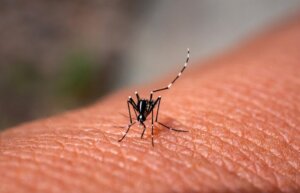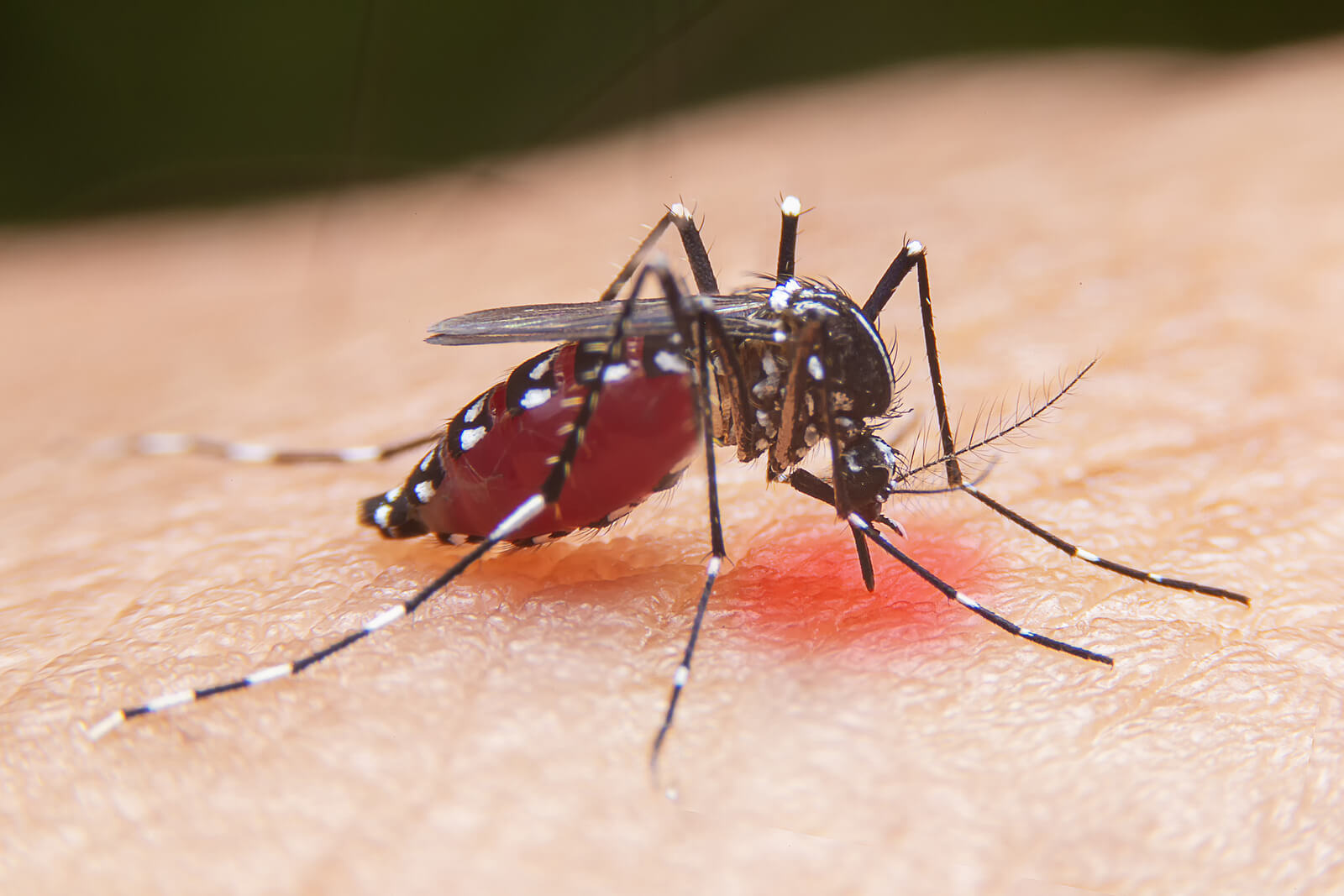Why Do Mosquitoes Bite?

Mosquitoes are blood-sucking insects. They can be very annoying during the warmer months of the year due to their bites. However, some people are more affected by mosquitoes than others, and this is a fact with a reasonable explanation. Do you want to know why mosquitoes bite? Keep reading!
Mosquito bites can cause very uncomfortable skin lesions that cause itching and inflammation of the area. These insects are also capable of transmitting various diseases such as malaria and dengue by biting humans. In this sense, a sting can cause different complications beyond simple discomfort.
Who do mosquitoes bite?

Today, researchers have managed to identify thousands of different mosquito species. Fortunately, they feed on multiple animals and not just humans. In fact, studies show that some species only feed on birds and reptiles.
The number of mosquito species capable of biting humans is around 200. They’re distributed throughout the world, however, they are more abundant in countries with tropical climates.
Only female mosquitoes feed on blood, so they’re the only ones capable of biting animals and humans. Male mosquitoes feed only on nectar, and are unable to bite.
Why do mosquitoes bite?
Generally speaking, female mosquitoes bite only to feed, however this isn’t a random event. In this sense, mosquitoes are guided by physical and chemical stimuli when searching, according to various investigations.
The main physical stimulus used by the insect is vision, as it responds to changes in ambient light and uses this method to find food sources over long distances. For its part, chemical stimuli are used in short distances, where the insect is able to distinguish various odors that guide it to its host, among which the following stand out.
Carbon dioxide (CO2)
The carbon dioxide emitted during respiration is one of the main factors that guide mosquitoes when it comes to biting. In this sense, adults are more affected than children by stings since they emit more CO2 when they breathe.
Mosquitoes are able to identify multiple hosts in a single environment, however, they need other stimuli before biting. Insects use different receptors to capture body temperature, humidity, and other smells like sweat before feeding.
In this way, both CO2 and factors specific to the host are decisive in determining whether or not mosquitoes bite a certain person. In fact, the decrease in environmental CO2 can reduce the number of mosquitoes attracted, however, it will not necessarily reduce the number of bites.
Lactic acid and other substances
Lactic acid is a substance that is excreted through sweat on the skin. It occurs after glucose metabolism in certain cells of the sweat glands. This substance works as an attractant for multiple species of mosquitoes, just like CO2.
This fact is very important as it also attracts different species belonging to the genus Aedes, which transmit diseases such as yellow fever and the Zika virus. Tall people and pregnant women tend to emit more lactic acid, so they’re prone to more stings.
Humans produce other substances that also have the ability to attract these blood-sucking insects. One of the most notable compounds is octenol, which is released with respiration. It’s capable of attracting more than 30 different species of mosquitoes.
Acetone, cadaverine, lysine, and estrogens such as estradiol are other substances capable of attracting mosquitoes that bite humans. In total, specialists have managed to identify more than 300 substances that generate an attractive effect on these insects, most of them present in sweat.
Sweat pH and bacterial flora

The human body is covered by multiple microorganisms that make up the microbiota. They fulfill a protective function, avoiding the colonization of pathogens. However, the metabolism of some bacteria can alter the composition of the skin, increasing the attraction of mosquitoes to humans.
Some researchers showed that people with alkaline pH sweat attract more mosquitoes. In general terms, the sweat of human beings has an acidic pH, that is, with figures below 7. However, some germs present on the skin can form a substance called ammonium, which causes the sweat to become alkaline.
On the other hand, these insects are more attracted to sweat after a few days. This fact can be explained since it has been in contact with bacteria for longer, so there’s a greater amount of ammonia present.
It all depends on each individual person
The main reason mosquitoes bite is to feed on blood. However, they can be attracted to certain specific people, who secrete high amounts of specific substances such as lactic acid and octenol. The microbiota also has a lot to do with this, as it can vary from one person to another.
On the other hand, certain individuals can secrete specific substances that work as repellants, so they’re less affected by mosquitoes. However, it’s always important to avoid bites as much as possible with the use of repellants and eliminate possible breeding sites.
Mosquitoes are blood-sucking insects. They can be very annoying during the warmer months of the year due to their bites. However, some people are more affected by mosquitoes than others, and this is a fact with a reasonable explanation. Do you want to know why mosquitoes bite? Keep reading!
Mosquito bites can cause very uncomfortable skin lesions that cause itching and inflammation of the area. These insects are also capable of transmitting various diseases such as malaria and dengue by biting humans. In this sense, a sting can cause different complications beyond simple discomfort.
Who do mosquitoes bite?

Today, researchers have managed to identify thousands of different mosquito species. Fortunately, they feed on multiple animals and not just humans. In fact, studies show that some species only feed on birds and reptiles.
The number of mosquito species capable of biting humans is around 200. They’re distributed throughout the world, however, they are more abundant in countries with tropical climates.
Only female mosquitoes feed on blood, so they’re the only ones capable of biting animals and humans. Male mosquitoes feed only on nectar, and are unable to bite.
Why do mosquitoes bite?
Generally speaking, female mosquitoes bite only to feed, however this isn’t a random event. In this sense, mosquitoes are guided by physical and chemical stimuli when searching, according to various investigations.
The main physical stimulus used by the insect is vision, as it responds to changes in ambient light and uses this method to find food sources over long distances. For its part, chemical stimuli are used in short distances, where the insect is able to distinguish various odors that guide it to its host, among which the following stand out.
Carbon dioxide (CO2)
The carbon dioxide emitted during respiration is one of the main factors that guide mosquitoes when it comes to biting. In this sense, adults are more affected than children by stings since they emit more CO2 when they breathe.
Mosquitoes are able to identify multiple hosts in a single environment, however, they need other stimuli before biting. Insects use different receptors to capture body temperature, humidity, and other smells like sweat before feeding.
In this way, both CO2 and factors specific to the host are decisive in determining whether or not mosquitoes bite a certain person. In fact, the decrease in environmental CO2 can reduce the number of mosquitoes attracted, however, it will not necessarily reduce the number of bites.
Lactic acid and other substances
Lactic acid is a substance that is excreted through sweat on the skin. It occurs after glucose metabolism in certain cells of the sweat glands. This substance works as an attractant for multiple species of mosquitoes, just like CO2.
This fact is very important as it also attracts different species belonging to the genus Aedes, which transmit diseases such as yellow fever and the Zika virus. Tall people and pregnant women tend to emit more lactic acid, so they’re prone to more stings.
Humans produce other substances that also have the ability to attract these blood-sucking insects. One of the most notable compounds is octenol, which is released with respiration. It’s capable of attracting more than 30 different species of mosquitoes.
Acetone, cadaverine, lysine, and estrogens such as estradiol are other substances capable of attracting mosquitoes that bite humans. In total, specialists have managed to identify more than 300 substances that generate an attractive effect on these insects, most of them present in sweat.
Sweat pH and bacterial flora

The human body is covered by multiple microorganisms that make up the microbiota. They fulfill a protective function, avoiding the colonization of pathogens. However, the metabolism of some bacteria can alter the composition of the skin, increasing the attraction of mosquitoes to humans.
Some researchers showed that people with alkaline pH sweat attract more mosquitoes. In general terms, the sweat of human beings has an acidic pH, that is, with figures below 7. However, some germs present on the skin can form a substance called ammonium, which causes the sweat to become alkaline.
On the other hand, these insects are more attracted to sweat after a few days. This fact can be explained since it has been in contact with bacteria for longer, so there’s a greater amount of ammonia present.
It all depends on each individual person
The main reason mosquitoes bite is to feed on blood. However, they can be attracted to certain specific people, who secrete high amounts of specific substances such as lactic acid and octenol. The microbiota also has a lot to do with this, as it can vary from one person to another.
On the other hand, certain individuals can secrete specific substances that work as repellants, so they’re less affected by mosquitoes. However, it’s always important to avoid bites as much as possible with the use of repellants and eliminate possible breeding sites.
- Martínez-de la Puente J, Soriguer R, Figuerola J. ¿A quién pican los mosquitos? Una gota de sangre basta para saberlo. Naturalmente. 2017; 13: 15-18.
- Torres-Estrada J, Rodríguez M. Señales físico químicas involucradas en la búsqueda de hospederos y en la inducción de picadura por mosquitos. Salud Publica Mex. 2003;45:497-50.
- McMeniman CJ, Corfas RA, Matthews BJ, Ritchie SA et al. Multimodal integration of carbon dioxide and other sensory cues drives mosquito attraction to humans. Cell. 2014 Feb 27;156(5):1060-71.
- Leal HM, Hwang JK, Tan K, Leal WS. Attraction of Culex mosquitoes to aldehydes from human emanations. Sci Rep. 2017 Dec 21;7(1):17965.
- Teltscher F, Bouvaine S, Gibson G, Dyer P et al. Understanding mosquito host-choice behaviour: a new and low-cost method of identifying the sex of human hosts from mosquito blood meals. Parasit Vectors. 2021 Jan 22;14(1):75.
- Allan SA, Day JF, Edman JD. Visual ecology of biting flies. Annu Rev Entomol. 1987;32:297–316.
Este texto se ofrece únicamente con propósitos informativos y no reemplaza la consulta con un profesional. Ante dudas, consulta a tu especialista.







